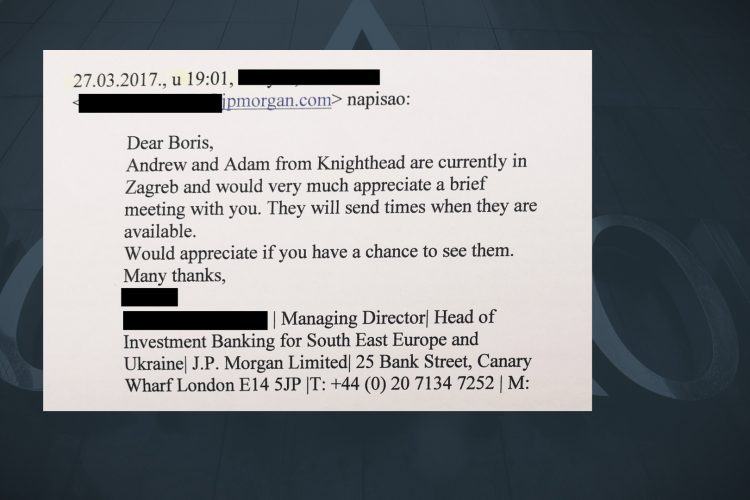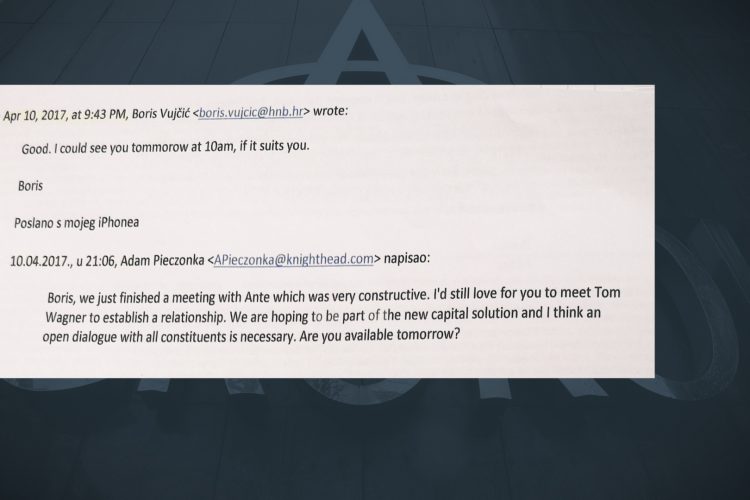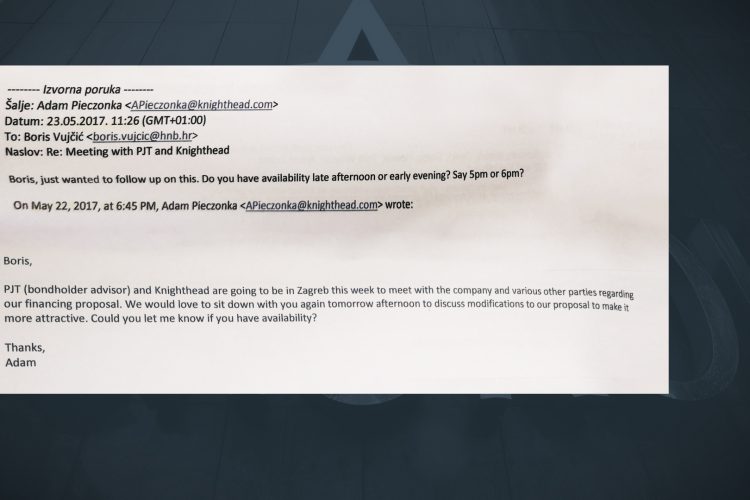
After more than two years of investigation and long-lasting procedures before the Committee for information and the High Administrative Court, N1 has obtained emails that the central bank governor, Boris Vujcic, exchanged with the junior analyst in the Knighthead hedge fund, Adam Pieczonka in 2017, at the height of the so-called Hotmail affair.
The previously unseen emails reveal new information, but also open up new questions.
The American hedge fund Knighthead appeared in Croatia in the spring of 2017, as Ante Ramljak and the team he dubbed “Borg” were writing the so-called Lex Agrokor, which was passed in April that year. The law allowed state-appointed management to take over the indebted food and retail group Agrokor to help save it from bankruptcy.
Ramljak served as the first crisis manager until Fabris Perusko took over in February 2018.
We learned that Knighthead representatives had met with Ramljak and that the bill was changed at the time to make it more favourable for the hedge fund, as well as that the authors of the bill were awarded lucrative consultancy contracts in Agrokor, measured in tens of millions of euros.
But, where does governor Vujcic come in? Our search for answers began after former Economy Minister Martina Dalic resigned and published a book in 2018 in which she mentioned that, after meeting with Vujcic, she was contacted by Knighthead junior analyst Adam Pieczonka.
The information that a central bank governor in an EU member country was meeting with a junior employee of a small fund seemed interesting and important to us and, ever since, we have been trying to find out the contents of Boris Vujcic’s official emails.
Vujcic had admitted to meetings taking place, so far three of them, in phases. He admitted the meetings were initiated by his contact in London, that they had explained to him what a roll-up loan was, but he refused to say more.
The emails in our possession offer some of the answers. The first email reveals that the Eastern Europe investment banking director in J. P. Morgan asked Vujcic to meet with Knighthead. Furthermore, the director wrote she expected Vujcic to adapt to Pieczonka in terms of setting the time of the meeting, and the mail indicates that Vujcic had already been familiar with who Pieczonka was and why Knighthead was in Zagreb. J. P. Morgan is one of Agrokor’s creditors, which makes it an interested party, and the bill, which was being drafted at the time, resulted in Knighthead becoming one of Agrokor’s owners.

The next email shows that Vujcic was not being completely honest when he said he directed Pieczonka to those involved in Agrokor after he learned what the issue was. Pieczonka asked for another meeting with Vujcic after he spoke to Ramljak, on the day Ramljak was named crisis manager, which means that this “productive” communication with Ramljak took place when he had no formal authority.

The third email shows how much Vujcic cooperated with Knighthead and how much he knew about their pushing the roll-up loan. That financing model did not exist in Croatia before the Agrokor case, and it is not used today either. It enables payment priority to those creditors who offer a new loan to the indebted company, which means that it places a stronger creditor, one with more funds, in a more favourable position, destroying the order of creditors and creates a less advantageous position for those creditors who, regardless of their guarantees, have less financial strength to take part in such arrangements.

In this email, Pieczonka is asking for a meeting with Vujcic so they can go through the financial offer in order to make it “more attractive”. Vujcic agreed to the meeting.
What do we know after reading these emails?
We know that the governor, at the request of one of interested parties, met with a representative of the fund who had also communicated with the authors of Lex Agrokor, pushed through the roll-up loan and finally became one of Agrokor’s owners. We know he was given their offers to read and was invited to make them more attractive. We know that is, to say the least, neither ethical or appropriate behaviour for a senior state official.
However, we have yet to learn if Vujcic, and to what degree, act outside of his authority and distribute privileged information.
During our investigation, the Information Commissioner had already made two decisions in favour of the public, and the High Administrative Court took our side as well. Their decision says that “it is in the public interest to remove any doubt in potential sharing of privileged information which may create a more advantageous position for one interested party…” In spite of that, the central bank is still using legal means to avoid publishing complete correspondence between the governor and the analyst.
We intend to continue our investigation because we believe the bank must make this correspondence available to the public.




Kakvo je tvoje mišljenje o ovome?
Budi prvi koji će ostaviti komentar!